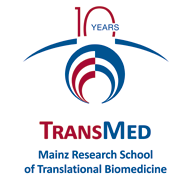Upcoming Events
Below you will find all upcoming events, such as talks, transferable skills courses, or lab courses.
All listed events carry a number of TransMed credit points corresponding to the time of attendance. 0.1 TransMed credit point is equivalent to 45 minutes of attendance.

Talk on resilience modelling: Adrian Dahl Askelund: Positive memory specificity as a resilience factor in at-risk adolescents: A longitudinal study
Positive memory specificity as a resilience factor in at-risk adolescents: A longitudinal study
Background
Depression is currently considered the greatest cause of ill health and disability worldwide. A known risk factor of subsequent depression is exposure to early life stress. Such exposure may operate by sensitizing the maturing psychophysiological stress response system to later-life stress. Notably however, some individuals show resilience and do not report mental health problems in the aftermath of later-life stressors. The factors that subserve this resilience remain to be revealed. Previous research has shown that activating positive memories may lower cortisol and mood responses to acute stress in humans and depression-like behavior in mice. It is still unknown whether recalling specific positive memories evokes resilient responses to later-life stressors when they occur naturally.
Method
We used longitudinal path modeling to study the effects of positive memory specificity on cortisol and mood in adolescents at risk for depression due to early life stress (N = 427, age: 14 years).
Results
We found that recalling more specific positive memories was associated with lower morning cortisol and fewer negative self-related thoughts over one year. Moderated mediation analyses demonstrated that positive memory specificity was associated with reduced depressive symptoms through lowered negative self-related thoughts, in response to negative life events.
Discussion
Positive memory specificity was associated with dampened negative effects of stressors over time, thereby operating as a resilience factor. This finding may have important clinical implications for at-risk populations, as positive memory specificity can be a target for prevention. I will discuss how improving positive memory specificity in at-risk adolescents may promote resilience and counteract prior vulnerability to depression.
| Datum | 13.12.2018 |
|---|---|
| Uhrzeit | 12:00 Uhr |
| Ort | Building 701 (NIC), ground floor, seminar room |
| Fortbildungspunkte | 0,1 CP TransMed |
| Dozent | Adrian Dahl Askelund Department of Psychiatry University of Cambridge |
| Sonstiges | |


 International Medical Services
International Medical Services
